人教版九年级英语上册(Unit4单词 短语 句式 知识梳理 精讲)
人教版九年级英语上第四单元单词短语知识点(供参考)
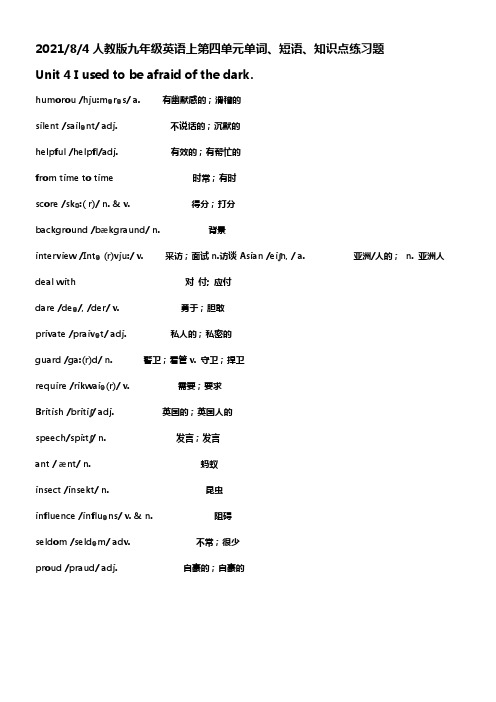
2021/8/4人教版九年级英语上第四单元单词、短语、知识点练习题Unit 4 I used to be afraid of the dark.humorou /hju:mərəs/ a. 有幽默感的;滑稽的silent /sailənt/ adj. 不说话的;沉默的helpful /helpfl/adj. 有效的;有帮忙的from time to time 时常;有时score /skɔ:(r)/ n. & v. 得分;打分background /bækgraund/ n. 背景interview /Intə (r)vju:/ v. 采访;面试n.访谈Asian /eiʃn, / a. 亚洲/人的;n. 亚洲人deal with 对付; 应付dare /deə/, /der/ v. 勇于;胆敢private /praivət/ adj. 私人的;私密的guard /ga:(r)d/ n. 警卫;看管v. 守卫;捍卫require /rikwaiə(r)/ v. 需要;要求British /britiʃ/ adj. 英国的;英国人的speech/spi:tʃ/ n. 发言;发言ant /ænt/ n. 蚂蚁insect /insekt/ n. 昆虫influence /influəns/ v. & n. 阻碍seldom /seldəm/ adv. 不常;很少proud /praud/ adj. 自豪的;自豪的be proud of 为⋯⋯自豪;感到自豪absent /æbsənt/ adj. 缺席;不在fail /feil/ v. 失败;未能(做到)examination /igzæmineiʃn/ n. 考试;审查boarding /bɔ:(r)diŋ/ school ` 寄宿学校in person 切身;亲自exactly /igzæktli/ adv. 确切地;精准地pride /praid/ n. 自豪;自豪take pride in 为⋯⋯感到自豪grandson /grænsʌn/ n. 孙子;外孙general /dʒenrəl/ a. 普遍的;常规的;总的n. 将军p.32introduction /intrədʌkʃn/ n. 介绍p.32Paula /pɔ:lə/ 葆拉(女名)p.26Alfred /ælfrid/ 艾尔弗雷德(男名)p.26Billy /bili/ 比利(男名)p.26Candy /kændi/ 坎迪(女名)p.27Jerry /dʒeri/ 杰里(男名);杰丽(女名)p.28Emily /emili/ 埃米莉(女名)p.28一.短语归纳ed to do 过去常常做2.deal with 对付应付3.be proud of 为……自豪,感到自豪4.take pride in 为……感到自豪5.from time to time 时常,有时6.in public 公布地7.in person 切身,亲自8.take up sth 开始做,同意,占用9.not……anymore 再也不10.worry about 为……忧虑11.hang out 闲逛12.think about 考虑13.be alone 独处14.on the soccer team 在足球队15.no longer 再也不16.make a decision 做决定17.to one’s surpris e 令某人吃惊的是18.even though 尽管19.pay attention to 对……注意,留意20.in the last few years 在过去的几年里21.be afraid of 可怕22.turn red 变红23.tons of attention 很多关注24.be careful 当心25.give up 舍弃26.a very small number of …极少数的……27.give a speech 作演讲28.all the time 一直老是29.be interested in 对……感爱好30.change one’s life 改变某人的生活31.take care of 照顾32.one of……,……之一二.用法集萃ed to do sth 过去常常做某 .2.be afraid of doing sth 可怕做某事3.have to do sth 必需做某事4.make sb do sth 让某人做某事5.give up doing sth 舍弃做什么6.try to do sth 尽力做某事7.adj+ enough to do sth 足够…而能够做某事8.be prepared to do sth 预备做某事9.see sb doing sth 看见某人在做某事10.begin to so sth 开始做某事11require sb to do sth 要求某人做某事12.decide to do 决定做某事13.make a decision to do sth 决定做某事14.It’s hard to believe that …很难相信……15.It +has+been +一段时刻+ since+从句自从……以来已经有很多长时刻了16.dare to do sth 勇于做某事17.It’s adj+ for sb+ to do sth对某人来讲做某18.take up doing sth 开始做某事三.语法全解1. 辨析:used to do sth. 过去常常做…get/be used to sth./doing sth. 适应于…be used to do 被用于做…(被动语态)be used by 由(被)…利用(被动语态)be used as … 被当做…利用(被动语态)be used for doing 被用于做…(被动语态)例: I used to go to work by bus. Now I take a taxi.He used to be a problem boy. She used to be very shy.I’m used to drinking a cup of water after meal.He’s been used to living in the dormitory.A hammer is used to drive nails.This machine is used to clean the floor.The girl is being used as a servant in the house.A knife can be used for cutting bread.2) afford(支付得起)的用法afford sth 买得起…… afford to do sth 有足够的…去做…例:His mother couldn’t afford to pay for her child’s education.They did not consider whether they could afford the time or not.We can’t afford to pay such a price. (such和so区别见P110)3) take pride in sth/ sb = be proud of sth/ sb 为…感到自豪例:He was watching me and take pride in everything good I do.I take pride in my child. =I’m proud of my child.注:He take pride in everything good I do. 这是一个定语从句。
九上英语人教版第四单元知识点

九上英语人教版第四单元知识点一、重点单词。
1. humorous.- 形容词,意为“有幽默感的;滑稽有趣的”。
例如:The teacher is very humorous and we all like his classes.(这位老师很幽默,我们都喜欢他的课。
)- 其名词形式是“humor”,意为“幽默”。
2. silent.- 形容词,“不说话的;沉默的”。
例如:He remained silent all the time.(他一直保持沉默。
)- 相关短语“keep silent”(保持沉默)。
其名词形式是“silence”,例如:The silence in the room made me nervous.(房间里的寂静让我紧张。
)3. helpful.- 形容词,“有用的;有帮助的”。
例如:This book is very helpful for my study.(这本书对我的学习很有帮助。
)4. score.- 作名词时,意为“得分;进球”。
例如:His score in the math test is very high.(他在数学考试中的分数很高。
)- 作动词时,意为“得分;进球”。
例如:He scored two goals in the football match.(他在足球比赛中进了两个球。
)5. background.- 名词,“背景”。
例如:His family background is very ordinary.(他的家庭背景很普通。
)6. interview.- 作名词时,“面试;访谈;采访”。
例如:I have an interview tomorrow.(我明天有一个面试。
)- 作动词时,“采访;面试;对……进行面谈”。
例如:The reporter interviewed the famous singer.(记者采访了那位著名的歌手。
)7. dare.- 作实义动词时,意为“敢于;胆敢”,有人称和数以及时态的变化,后接动词不定式。
英语九年级上人教新课标unit4知识汇总
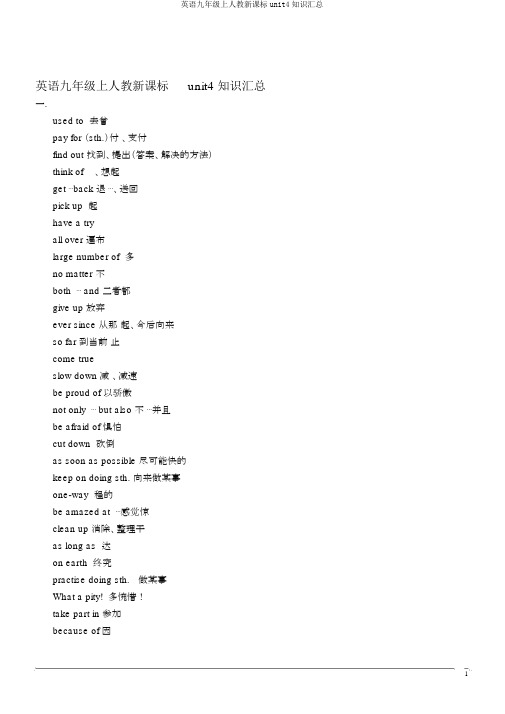
英语九年级上人教新课标unit4 知识汇总一.used to 去曾pay for (sth.)付、支付find out 找到、提出(答案、解决的方法)think of 、想起get ⋯back 退⋯、送回pick up 起have a tryall over 遍布large number of 多no matter 不both ⋯ and 二者都give up 放弃ever since 从那起、今后向来so far 到当前止come trueslow down 减、减速be proud of 以骄傲not only ⋯ but also 不⋯并且be afraid of 惧怕cut down 砍倒as soon as possible 尽可能快的keep on doing sth. 向来做某事one-way 程的be amazed at ⋯感觉惊clean up 消除、整理干as long as 达on earth 终究practise doing sth. 做某事What a pity! 多惋惜!take part in 参加because of 因二.要点句型及用法1.Have you got any brothers or sisters?2.She used to be a history teacher.3.One day the librarian came up with an idea.4.No matter what the weather is like you can always find surfers out riding the waves.5.Whenever someone throws in some rubbish, it produces a piece of music.6.It ’ s a pleasant way to help keep our city clean.7.Taking care of our vironment is very important.8.It ’ s our duty to keep our environment clean and tidy.9.The more trees, the better.10.Make sure that all of the rubbish goes into the dustbin.11.I hope to see you as soon as possible.12.I ’ m free except today.13.In the south of the island, there is scuba diving, fishing and boating.14.It takes about twelve hours if you take k37 train.15.That ’ s a deal.三. 考点:1.pay, cost, spend, takeA. pay v. ⋯ 酬, pay for ⋯付款pay money for 花⋯B.cost 某物花(某人)多少The new radio cost her twenty yuan.C. spend 指花和金I usually spend 300 yuan on newspapers every year.Tom spent one hour playing football yesterday.D.take 做某事花(某人)多少It takes us twenty minutes to write down the new words.ed to, be used toWhen I was a child, I used to climb that hill.We are used to the weather here.我已适了的天气。
人教版(新目标)初中英语九年级上册Unit4知识点汇总

humorous[ˈhjuːmərəs]有幽默感的;滑稽有趣的silent[ˈsaɪlənt]不说话的;沉默的helpful['helpfəl]有用的;有帮助的from time to time[frɒm//taɪm//tuː//taɪm]时常;有时score[skɔː]得分;打分background[ˈbækɡraʊnd]背景interview[ˈɪntəvjuː]采访;面试 n. Asian[ˈeɪʃ(ə)nˌˈeɪʒ(ə)n]亚洲的;亚洲人的,亚洲人deal with对付;应付dare[deə]敢于;胆敢private[ˈpraɪvɪt]私人的;私密的guard[ɡɑːd]警卫;看守v.守卫;保卫require[rɪˈkwaɪə]需要;要求European[jʊərəˈpiːən]欧洲的;欧洲人的British['brɪtɪʃ]英国的;英国人的speech[spiːtʃ]讲话;发言ant[ænt]蚂蚁insect[ˈɪnsekt]昆虫influence[ˈɪnflʊəns]影响seldom[ˈseldəm]不常;很少proud[praʊd]自豪的;骄傲的be proud of为⋯⋯骄傲;感到自豪absent[ˈæbsənt]缺席;不在fail[feɪl]失败;未能(做到)examination[ɪgˌzæmɪ'neɪʃən]考试;审查boarding school寄宿学校in person亲身;亲自exactly[ɪg'zæktli]确切地;精确地pride[praɪd]自豪;骄傲take pride in为⋯⋯感到自豪grandson[ˈɡrændsʌn]孙子;外孙general[ˈdʒenər(ə)l]普遍的;常规的;总的将军introduction[ɪntrəˈdʌkʃ(ə)n]介绍Paula 葆拉(女名)Alfred 艾尔弗雷德(男名)Billy 比利(男名)Candy 坎迪(女名)Jerry 杰里(男名);杰丽(女名)Emily 埃米莉(女名)02 U n i t 4 知识梳理Unit4 I used to be afraid of the dark.【重点短语】ed to do 过去常常做2.deal with 对付应付3.be proud of 为……骄傲,感到自豪4.take pride in 为……感到自豪5.fromtime to time 时常,有时6.i n public 公开地7.i n person 亲身,亲自8.t ake up sth 开始做,接受,占用9.not……anymore不再10.worry about 为……担忧11.hang out 闲逛12.thinkabout 考虑13.be alone 独处14.on the soccer team 在足球队15.no longer 不再16.make a decision 做决定17.to one’s surprise 令某人吃惊的是18.even though 尽管19.pay attention to 对……注意,留心20.in the last few years 在过去的几年里21.be afraid of 害怕22.turn red 变红23.tons of attention 很多关注24.be careful 当心25.give up 放弃26.a very small number of …极少数的……27.give a speech 作演讲28.all the time 一直总是29.be interested in 对……感兴趣30.change one’s life 改变某人的生活31.take care of 照顾32.one of…, ……之一【重点句型】1. I used to be afraid of the dark. 我过去常常前害怕黑暗.2.I go to sleep with my bedroom light on. 我开着卧室的灯睡觉.3.I used to spend a lot of time playing games with my friends. 以前我常常花很多时间和我的朋友们玩游戏.4.I hardly ever have time for concerts.我几乎没有时间去听音乐会.5.My life has changed a lot in the last few years.我的生活在过去几年里改变了很多.6.It will make you stressed out.那会使你紧张的.7.It seems that Yu Mei has changed a lot.玉梅似乎变化很大.03词汇精讲1.silentsilent是形容词,意为“沉默的;无言的”,其名词形式为silence。
中考复习人教版九年级上册英语unit4---6单元知识汇总
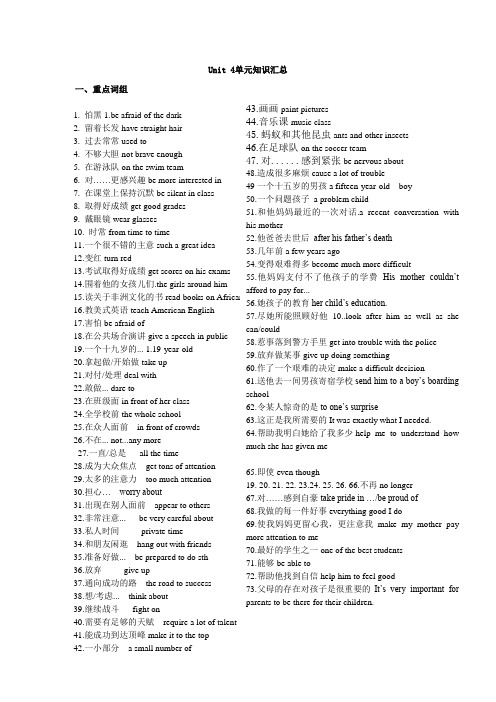
Unit 4单元知识汇总一、重点词组 1. 怕黑1.be afraid of the dark 2. 留着长发have straight hair 3. 过去常常used to 4. 不够大胆not brave enough 5. 在游泳队on the swim team 6. 对……更感兴趣be more interested in 7. 在课堂上保持沉默be silent in class 8. 取得好成绩get good grades 9. 戴眼镜wear glasses 10. 时常from time to time 11.一个很不错的主意such a great idea 12.变红turn red 13.考试取得好成绩get scores on his exams 14.围着他的女孩儿们.the girls around him 15.读关于非洲文化的书read books on African culture 16.教美式英语teach American English 17.害怕be afraid of 18.在公共场合演讲give a speech in public 19.一个十九岁的... 1.19-year-old 20.拿起做/开始做take up 21.对付/处理deal with 22.敢做... dare to 23.在班级面in front of her class 24.全学校前the whole school 25.在众人面前 in front of crowds 26.不在... not...any more 27.一直/总是 all the time 28.成为大众焦点 get tons of attention 29.太多的注意力 too much attention 30.担心… worry about 31.出现在别人面前 appear to others 32.非常注意... be very careful about 33.私人时间 private time 34.和朋友闲逛 hang out with friends 35.准备好做... be prepared to do sth 36.放弃 give up 37.通向成功的路 the road to success 38.想/考虑... think about 39.继续战斗 fight on 40.需要有足够的天赋 require a lot of talent 41.能成功到达顶峰make it to the top42.一小部分 a small number of43.画画paint pictures 44.音乐课music class 45.蚂蚁和其他昆虫ants and other insects 46.在足球队on the soccer team 47.对......感到紧张be nervous about 48.造成很多麻烦cause a lot of trouble 49一个十五岁的男孩a fifteen-year-old boy 50.一个问题孩子 a problem child 51.和他妈妈最近的一次对话.a recent conversation with his mother 52.他爸爸去世后 after his father’s death 53.几年前a few years ago 54.变得艰难得多become much more difficult 55.他妈妈支付不了他孩子的学费 His mother couldn’t afford to pay for... 56.她孩子的教育her child’s education. 57.尽她所能照顾好他10..look after him as well as she can/could 58.惹事落到警方手里get into trouble with the police 59.放弃做某事give up doing something 60.作了一个艰难的决定make a difficult decision 61.送他去一间男孩寄宿学校send him to a boy’s boarding school 62.令某人惊奇的是to one’s surprise 63.这正是我所需要的It was exactly what I needed. 64.帮助我明白她给了我多少help me to understand how much she has given me 65.即使even though 19. 20. 21. 22. 23.24. 25. 26. 66.不再no longer 67.对……感到自豪take pride in …/be proud of 68.我做的每一件好事everything good I do 69.使我妈妈更留心我,更注意我make my mother pay more attention to me 70.最好的学生之一one of the best students 71.能够be able to 72.帮助他找到自信help him to feel good 73.父母的存在对孩子是很重要的It’s very important for parents to be there for their children.二、重点句子。
人教版九年级上册英语 Unit 4 词汇与语法基础(解析版) (1)
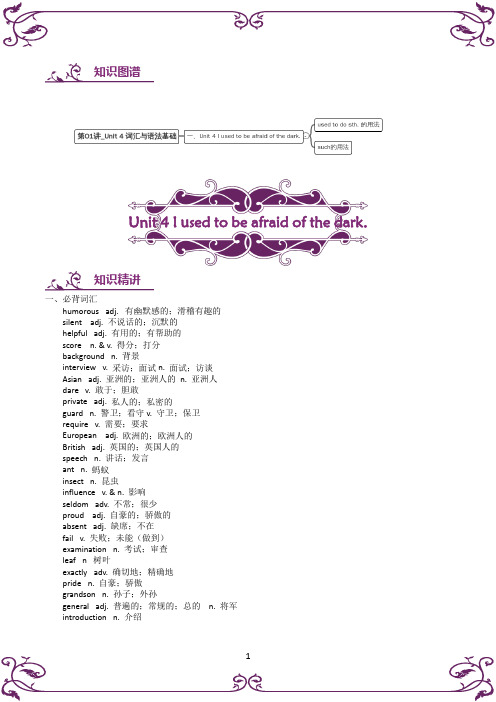
知识图谱Unit 4 I used to be afraid of the dark.知识精讲一、必背词汇humorous adj. 有幽默感的;滑稽有趣的silent adj. 不说话的;沉默的helpful adj. 有用的;有帮助的score n. & v. 得分;打分background n. 背景interview v. 采访;面试n. 面试;访谈Asian adj. 亚洲的;亚洲人的n. 亚洲人dare v. 敢于;胆敢private adj. 私人的;私密的guard n. 警卫;看守v. 守卫;保卫require v. 需要;要求European adj. 欧洲的;欧洲人的British adj. 英国的;英国人的speech n. 讲话;发言ant n. 蚂蚁insect n. 昆虫influence v. & n. 影响seldom adv. 不常;很少proud adj. 自豪的;骄傲的absent adj. 缺席;不在fail v. 失败;未能(做到)examination n. 考试;审查leaf n 树叶exactly adv. 确切地;精确地pride n. 自豪;骄傲grandson n. 孙子;外孙general adj. 普遍的;常规的;总的n. 将军introduction n. 介绍二、重点词汇1. humorous adj.funny, or making you laugh幽默的;滑稽的例句:Her latest book is a humorous look at teenage life.她的新书是对青少年生活的一种幽默审视。
2. interview v.1). a meeting in which someone asks you questions to see if you are suitable for a job or course面试;面谈例句:I had an interview for a job with a publisher.我参加了一家出版公司的求职面试。
人教版英语九年级上册Unit4知识点梳理及语法讲解
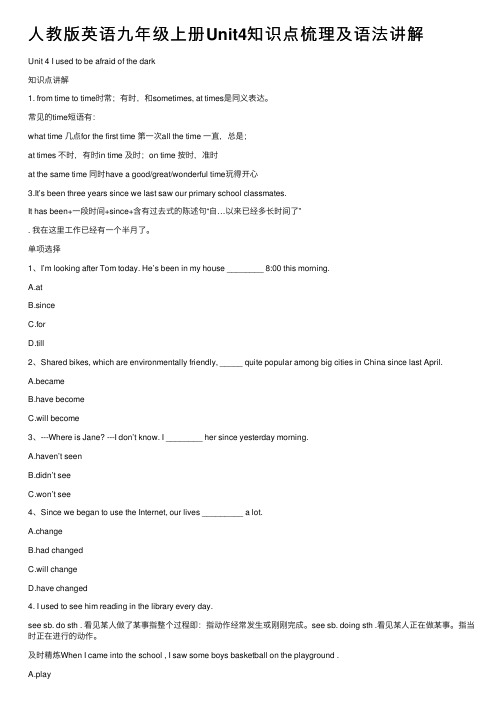
⼈教版英语九年级上册Unit4知识点梳理及语法讲解Unit 4 I used to be afraid of the dark知识点讲解1. from time to time时常;有时,和sometimes, at times是同义表达。
常见的time短语有:what time ⼏点for the first time 第⼀次all the time ⼀直,总是;at times 不时,有时in time 及时;on time 按时,准时at the same time 同时have a good/great/wonderful time玩得开⼼3.It’s been three years since we last saw our primary school classmates.It has been+⼀段时间+since+含有过去式的陈述句“⾃…以来已经多长时间了”. 我在这⾥⼯作已经有⼀个半⽉了。
单项选择1、I’m looking after Tom today. He’s been in my house ________ 8:00 this morning.A.atB.sinceC.forD.till2、Shared bikes, which are environmentally friendly, _____ quite popular among big cities in China since last April.A.becameB.have becomeC.will become3、---Where is Jane? ---I don’t know. I ________ her since yesterday morning.A.haven’t seenB.didn’t seeC.won’t see4、Since we began to use the Internet, our lives _________ a lot.A.changeB.had changedC.will changeD.have changed4. I used to see him reading in the library every day.see sb. do sth . 看见某⼈做了某事指整个过程即:指动作经常发⽣或刚刚完成。
人教版初中九年级英语Unit3-Unit4知识梳理

重点句型 1. —打扰一下,你知道我在哪里可以买到一些药吗? —当然。沿着这条路走下去有一家超市。 — _E_x_c_u_s_e_ _m_e_, do you know _w_h_e_r_e_ I_ _c_a_n_buy some medicine? —Sure. _T_h_e_r_e_'s_ a supermarket d_o_w__n_the street.
9.有时我们甚至需要花费时间来导入我们的请求。 Sometimes we even need to _s_p_e_n_d_ time _le_a_d_i_n_g_ into a request. 10.礼貌措辞似乎比直白说话要难一些。 It might _s_e_e_m_ _m__o_re_ _d_if_f_ic_u_l_t to speak politely than directly.
7.两种(表达)都是正确的,但第一种听起来不太礼貌。 Both are correct, but the first one sounds _le_s_s_ _p_o_li_te_ . 8.他们所使用的表述或许取决于他们在与谁交谈,以及 他们之间的熟悉程度。 The expressions they use might depend on _w_h__o_m_ _th_e_y_ _a_re_ speaking to or _h_o_w_ _w__el_l _th__ey_ _k__n_o_w_ each other.
24.自豪;骄傲 n. _p_r_id_e_→adj. 自豪的;骄傲的 _p_r_o_u_d_ 25.普遍的;常规的adj. 将军n. _g_e_n_e_r_a_l →adv. 普遍地; 总地 _g_en__er_a_l_ly_
重点短语 1. 路过;经过 _p_a_s_s_b_y_ 2.抱歉;什么 _p_a_r_d_o_n__m_e_ 3.停车场 _p_a_r_k_in_g__l_o_t 4.时常;有时 _fr_o_m__t_i_m_e__to__t_im__e 5.公开地;在别人面前 _in__p_u_b_l_ic_ 6.寄宿学校 _b_o_a_r_d_in_g__s_c_h_o_o_l
- 1、下载文档前请自行甄别文档内容的完整性,平台不提供额外的编辑、内容补充、找答案等附加服务。
- 2、"仅部分预览"的文档,不可在线预览部分如存在完整性等问题,可反馈申请退款(可完整预览的文档不适用该条件!)。
- 3、如文档侵犯您的权益,请联系客服反馈,我们会尽快为您处理(人工客服工作时间:9:00-18:30)。
Unit4 01单词词汇
humorous [ˈhjuːmərəs] 有幽默感的;滑稽有趣的silent [ˈsaɪlənt] 不说话的;沉默的
helpful ['helpfəl] 有用的;有帮助的
from time to time [frɒm//taɪm//tuː//taɪm] 时常;有时score [skɔː] 得分;打分
background [ˈbækɡraʊnd] 背景
interview [ˈɪntəvjuː] 采访;面试n.
Asian [ˈeɪʃ(ə)nˌˈeɪʒ(ə)n] 亚洲的;亚洲人的,亚洲人deal with 对付;应付
dare [deə] 敢于;胆敢
private [ˈpraɪvɪt] 私人的;私密的
guard [ɡɑːd] 警卫;看守v.守卫;保卫
require [rɪˈkwaɪə] 需要;要求
European [jʊərəˈpiːən] 欧洲的;欧洲人的
British ['brɪtɪʃ] 英国的;英国人的
speech [spiːtʃ] 讲话;发言
ant [ænt] 蚂蚁
insect [ˈɪnsekt] 昆虫
influence [ˈɪnflʊəns] 影响
seldom [ˈseldəm] 不常;很少
proud [praʊd] 自豪的;骄傲的
be proud of 为⋯⋯骄傲;感到自豪
absent [ˈæbsənt] 缺席;不在
fail [feɪl] 失败;未能(做到)
examination [ɪgˌzæmɪ'neɪʃən] 考试;审查boarding school 寄宿学校
in person 亲身;亲自
exactly [ɪg'zæktli] 确切地;精确地
pride [praɪd] 自豪;骄傲
take pride in 为⋯⋯感到自豪
grandson [ˈɡrændsʌn] 孙子;外孙
general [ˈdʒenər(ə)l] 普遍的;常规的;总的将军introduction [ɪntrəˈdʌkʃ(ə)n] 介绍
Paula 葆拉(女名)
Alfred 艾尔弗雷德(男名)
Billy 比利(男名)
Candy 坎迪(女名)
Jerry 杰里(男名);杰丽(女名)
Emily 埃米莉(女名)
Unit4 02词汇精讲
1. silent
silent是形容词,意为“沉默的;无言的”,其名词形式为silence。
例如:
We shouldn’t keep silent when the teacher asks us some questions.
当老师问我们问题时,我们不应该保持沉默。
She was silent when her mother asked her questions.
她妈妈问她问题她沉默不语。
When we face danger, we should keep calm.
面对危险,我们应该保持沉着、冷静。
The baby kept still when she was taking photos.
当给这个婴儿拍照时,她一动也不动。
Be quiet, everyone. The teacher is coming.
同学们,安静!老师来了。
2. helpful
helpful 形容词,意为“有帮助的”。
例如:
The dictionary is very helpful to me.
那本字典对我很有帮助。
helpful是由动词help加后缀“-ful”构成的形容词。
动词加后缀“-ful”变成形容词,是一种常见的构词法,类似的这样的词还有很多。
例如:
care→ careful
use→ useful
wonder→wonderful
3. score
(1)score作动词,意为“得分;获胜”。
例如:
Hughes scored two goals before half-time.
休斯在上半场进了两个球.
The army continued to score successes in the south.
军队在南方不断取得胜利。
(2)score作名词,意为“得分;二十;乐谱”。
例如:
I recorded the score in a notebook.
我在笔记本上记下了分数。
He bought two scores of apples yesterday.
他昨天买了四十个苹果。
Look at the score and try to play that song.
看乐谱演奏一下那首曲子。
4. interview
interview用作动词,意为“采访,面试”。
be interviewed by意为“被……采访”。
例如: We are going to interview the manager of this company.
我们将要采访这家公司的经理。
He has interviewed a lot of people for the job.
他已面试过很多应聘这份工作的人。
5. dare
(1)dare用作实义动词,意为“敢于;胆敢”。
常构成短语dare to do sth.意为“敢于做某事”。
有时to 也可省去(尤其是在否定句或疑问句)。
例如:
He didn’t dare to look at her in the eye.
他不敢正眼看她。
Did he dare (to) tell her? 他敢告诉她吗?
We don’t dare (to) say anything. 我们什么也不敢说。
(2)dare可用作情态动词,用作情态动词时,意思是“敢”,其后接动词原形,通常只用于否定句或疑问句以及if或whether引导的从句中,一般不用于肯定句。
例如:
I don’t know whether he dare try. 我不知他是否敢试一试。
I daren’t ask her for a rise. 我不敢要求她加薪。
【注意】dare后通常不接动词的进行式。
6. seldom
seldom是副词,意为“很少,不常”,反义词是often,通常置于行为动词之前,be动词,情态动词和助动词之后,是一个表示否定意义的副词。
例如:
Mr Brown seldom goes out. 布朗先生很少外出。
【拓展】always, usually, often, sometimes和never是英语中最常见的频度副词。
(1)always 的频度为100%,表示动作重复、状态继续,中间没有间断,意思是“总是”、“永远地”。
例如:
The sun always rises in the east and sets in the west.
太阳总是东升西落。
(2)usually 的频度为80%左右,意为“通常”、“平常”,即很少有例外。
例如:
He usually goes to bed at ten o’clock.
他通常10点钟睡觉。
(3)often 的频度为60%左右,意为“常常”,但不如usually那么频繁,表示动作重复,中间有间断。
例如:
He is often late for school. 他上学经常迟到。
(4) sometimes 的频度为40%左右,意为“有时”,表示动作偶尔发生。
可以位于句首,以示强调。
例如:
It is sometimes hot and sometimes cold. 天气忽冷忽热。
Sometimes he does it this way and sometimes he does it that way.
他有时这样做,有时那样做。
(5) seldom的频度为20%左右,意为“很少”、“不经常”。
例如:
I seldom go out these days. 这些天我几乎不出门。
(6) never 的频度为0,意为“从来不”、“永不”。
例如:
My parents are never late for work.
我父母上班从来不迟到。
7. pride
pride是名词,意为“骄傲,自豪”。
常用的结构:take pride in sth. 意为“为某事骄傲”。
They take great pride in her daughter who is now a famous scientist.
他们为成为科学家的女儿而感到自豪。
He is the pride of our city. 他是我们城市的骄傲。
【拓展】proud 是形容词,常用结构:be proud of sth. 意为“以……而骄傲”。
I am very proud of being a Chinese.
作为一名中国人我很自豪
be proud to do sth. 意为“为做某事而骄傲”。
We are proud to be a league member.
我们为成为团员而骄傲。
8. absent
absent是形容词,意为“不在的;缺席的”。
例如:。
